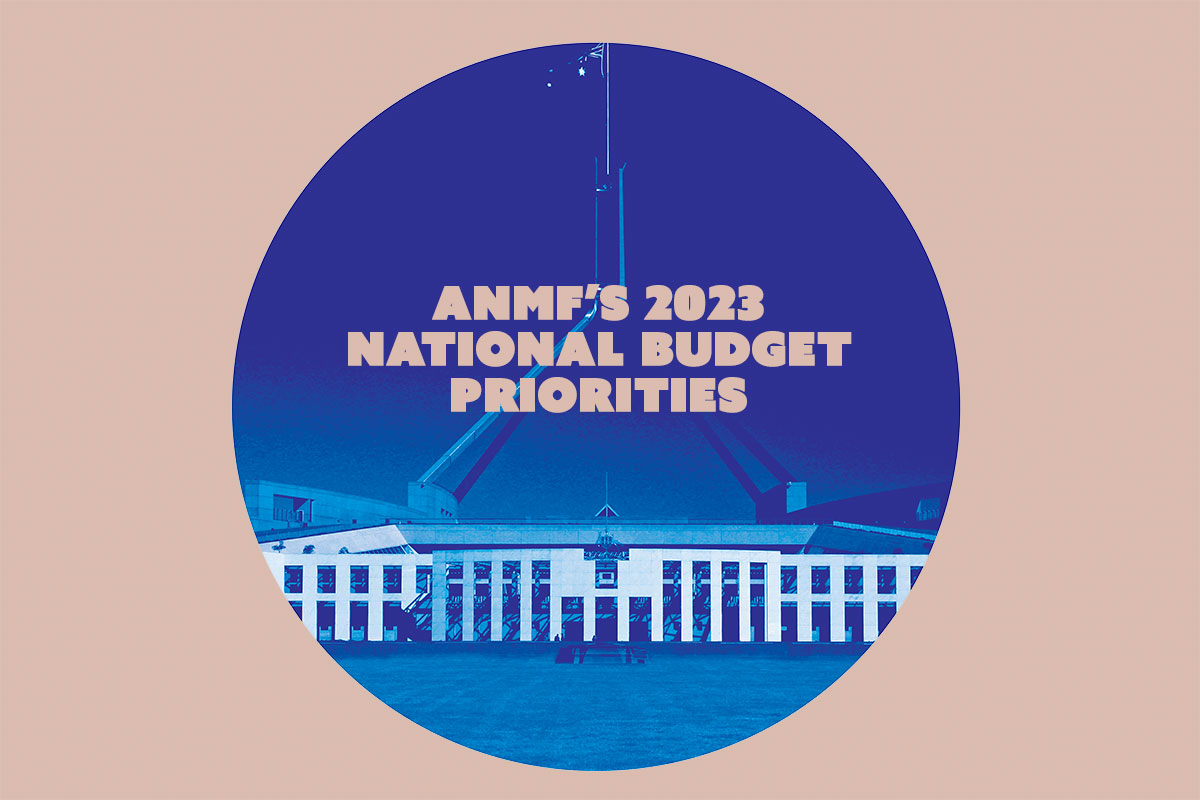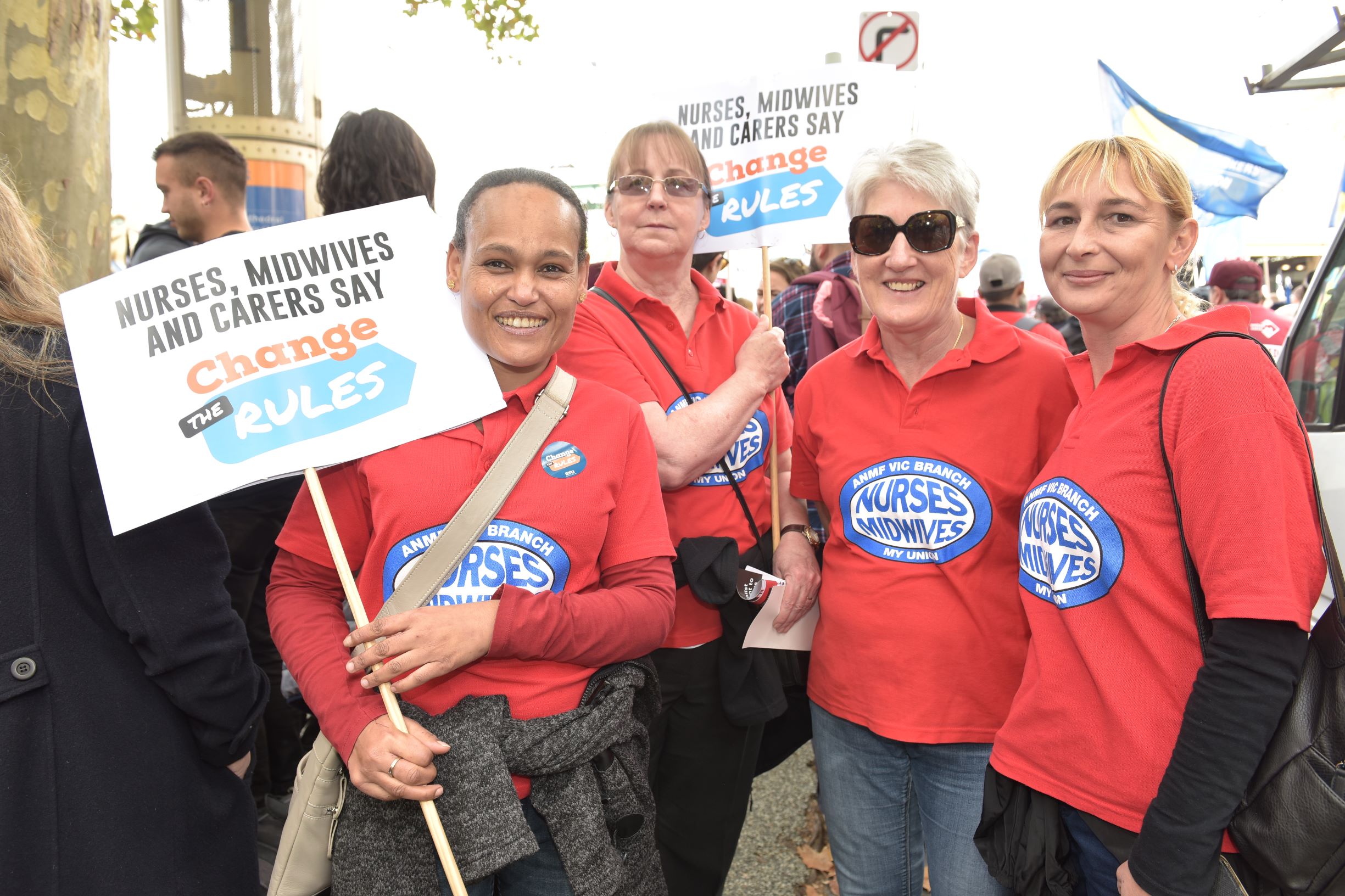
ANMF has put its national policy priorities for this year’s Federal Budget to the Albanese Government. They are divided into several key areas, including:
- Nursing, midwifery and carer workforce reform
- Gender equity
- Improving equity in access to health care
- Aged care reform
Below is a brief summary of some key priorities.
Nursing, midwifery and carer workforce reform
In order to retain the existing nursing, midwifery and carer workforce and to grow the workforces of the future, we must ensure sufficient numbers of new graduates and arrest the numbers of experienced nurses and midwives either leaving the professions prematurely, reducing their hours, or turning to casual employment to achieve shifts that suit their non-work life.
The ANMF has recommended that the Federal Government adopts a variety of measures, across areas including:
Flexible work arrangements and rostering
Nationally, the ANMF recommends that states and territories undertake dedicated projects – with Federal Government financial support – to develop employee-centred rostering principles that will bring nurses and midwives back to the bedside. Victoria is the first state branch to do so, with the current rostering project being run this year in collaboration with Safer Care Victoria, the Department of Health and three Victorian health services.
Undergraduate and postgraduate education and support
The ANMF has put several recommendations to the Federal Government, many of which have already been implemented or promised by the Andrews Victorian Government, in response to ANMF members’ asks. These include:
- HECS debt relief
- scholarships to support nurses and midwives to undertake postgraduate or post-registration studies in targeted clinical areas
- funding for extra preceptors
- free TAFE places for diploma of nursing students
- financial support for ENs to become registered nurses and/or midwives
- and targeted grants to support those undertaking return to practice/refresher programs.
Structured employment models for nursing & midwifery students
ANMF has called on the Federal Government to formalise and fund a national version of the Victorian-initiated Registered Undergraduate Student of Nursing/Midwifery (RUSON/M) employment model.
Regulatory requirements and checks
Victorian members passed a motion at the 2022 Delegates Conference to ask ANMF (Vic Branch) to lobby the Andrews Government to introduce one central check for nurses and midwives to replace the multiple, time-consuming and costly criminal history/record and associated ‘checks’. As part of its 2022 election commitments, the Andrews Government has agreed to a central check that will replace the NDIS/Working with Children, Police and associated checks.
ANMF Federal Office is calling on the Federal Government to follow suit.
Gender equity
The ANMF recognises that achieving gender equity requires legislative, policy and structural intervention on the part of state/territory and federal governments. In several key areas where recommendations have been made to the Federal Government, Victoria has already begun making changes.
Childcare and parental leave
A lack of access to affordable childcare has significant implications for the retention of workers across the sector. In Victoria, the Andrews Government has made kinder free for all three- and four-year-old children, and committed to opening 50 new state-owned childcare centres that, wherever possible, will be co-located with schools, in close proximity to hospitals and which operate for extended hours and on weekends.
The ANMF recommends that the Federal Government follow suit and expand childcare services for shift workers providing essential services outside standard working hours and introduce before and after care for early childhood education/kindergarten centres.
The ANMF commends the Federal Government for its recent announcement that it will extend government-funded paid parental leave (PPL) to 26 weeks by 2026, but further recommends that leave entitlements be increased to 26 weeks paid leave for each caregiver, and that PPL entitlements offer flexibility in how they are utilised, among other things.
The ANMF further recommends that superannuation be payable on all periods of parental leave and paid/unpaid carers leave. Victorian public sector nurses and midwives achieved this in the general and mental health 2020 EBA. Some private acute EBAs include superannuation on the paid component of parental leave.
Improved equity in access to healthcare
Healthcare funding reform
Healthcare funding reforms are necessary. The ANMF recommends that the Federal Government adopt the following measures, among others:
- Implement a permanent 50/50 public hospital funding agreement between the Commonwealth and State/Territory governments.
- Discontinue fee-for-service arrangements in general practice.
- Amend Commonwealth Health Insurance legislation and National Health Agreements to ensure all babies are counted for funding purposes.
More effective nurse/midwife led models of care
Nurse practitioners offer a promising and evidence-based solution to many issues with access and inequity. With stronger government support, nurse practitioners will be pivotal in addressing contemporary and future health challenges throughout Australia. Midwives must also be better supported through effective policy, legislation and funding of continuity models to contribute to better outcomes for mothers and babies, particularly in regional and remote areas.
At the last election, the Andrews Government gave a commitment to audit existing employed nurse practitioners. This will inform the development of employment and career pathways so nurse practitioners can work to their full capacity and the introduction of 100 nurse practitioner scholarships.
The ANMF recommends that the Federal Government adopt the following measures, among others:
- Provide sustainable funding to trial, evaluate and scale up innovative and multi-disciplinary integrated models of care including nurse-/midwife-led approaches, community-based extended hours mental health services, ‘Buurtzorg model’ community nursing, primary healthcare multidisciplinary and nurse-led clinics, Nurse Navigator models and others.
- Implement the recommendations made by the Nurse Practitioner Reference Group to the MBS Taskforce related to nurse practitioner services.
- Provide sustainable funding to develop a national policy on home birth, promote midwife-led models of care, and remove barriers to facilitate improved conditions and scope for privately practicing midwives.
- Implement the Safe Workloads in Midwifery (SWiM) Standards.
Aged care reform
The ANMF welcomed the Albanese Government’s commitment to critical and urgent aged care reform, including legislated requirements for 24 hour registered nurse presence at every Australian nursing home, mandated minimum care hours in nursing homes, and increasing requirements for transparency in the aged care sector.
In February, the Fair Work Commission announced its interim decision to increase aged care nurses and personal care workers award wages by 15 per cent. ANMF is calling on the Albanese Government to ensure providers pass on all wages funding to their staff regardless of whether they are on award wages or EBA wages.
The ANMF further recommends that, among other things, the Federal Government:
- Specify, within the mandated minimum care minute target, the minimum portion that must be provided by ENs, i.e. 40 minutes.
- Implement a national registration scheme via AHPRA for personal care workers/assistants in nursing, which includes a standardised national minimum qualification for entry to practice, at little or no cost these workers.
- Enhance articulation between PCW/AIN, EN, RN, and NP roles and fund pathway from PCW/AIN – EN – RN and support RN to NP in aged care with guaranteed employment opportunities.
- Focus on audits and prosecution of breaches of obligations by aged care employers, including breaches concerning payment of wages and minimum care minutes.
Aged care/healthcare interface
As identified by the Royal Commission into Quality and Safety in Aged Care, many of the failures in care across the sector stem from a lack acknowledgement that aged care is also health care. The ANMF recommends, among other things, that the Federal Government:
- Increase and embed Residential in Reach (RIR) in public health services to reduce hospital admissions from aged care services.
- Embed and expand Aged Care Assessment Teams (ACAT) in the public sector.
- Expand the role of nurse practitioners in aged care via a national plan.
Additional transparency measures
The ANMF recommends that the Federal Government introduce a transparent star rating system (1 to 10) that tells workers and residents/families at a glance how the employer treats workers: wages (level above the award), level of casuals, average years of experience across the care workforce, security of employment, engagement with workforce (satisfaction levels).




